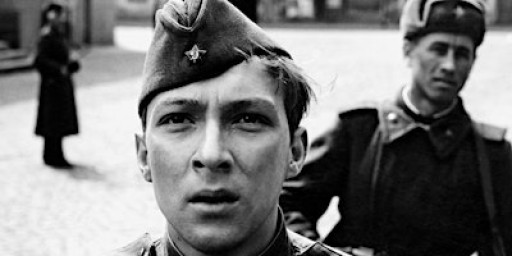

Celebrating the 100th birthday of East German director Konrad Wolf.
Widely regarded as Konrad Wolf’s most significant and autobiographical film—and a landmark of postwar German cinema—I was 19 traces the experiences of a German-born soldier in the Soviet army as it approaches Berlin in the final days of World War II.
The film will be introduced by Martin Brady.
April 1945. As a lieutenant in the Soviet army, Gregor Hecker enters Germany – for him it is also a return home. As a child, he had fled Nazi Germany with his parents and emigrated to the Soviet Union, eventually joining the Soviet army after the war broke out. Fluent in German, his main task is to drive through the territory north of Berlin and call out to German soldiers via loudspeaker, urging them to surrender. During this time, Gregor meets a range of Germans, from a displaced and frightened young woman to high-ranking army officers, from skeptical farmers to soldiers still determined to kill. These encounters stir conflicting emotions in him - sympathy for some, and shock at the brutality and deceit of others.
Although inspired by Wolf’s diary entries and based on retrospective reconstructions of events from April 1945 onward (when the chaos of events interrupted his diary keeping), Ich war 19 is not a literal retelling of Wolf’s own experiences. Yet, according to screenwriter Wolfgang Kohlhaase—with whom Wolf worked for the first time—the locations, Gregor’s trajectory around Berlin, often through wide open landscapes, and above all the “moral situation” – Gregor’s ambivalent loyalties - are authentic. With the distance of more than two decades, Konrad Wolf was able to revisit his own past between two identities to explore how Germany’s history could be portrayed within the framework of the GDR’s ideological self-concept. Structured like a matter-of-fact diary, the film avoids melodrama and pathos, unfolding through a series of episodes that reveal Gregor’s shifting emotions, his vulnerability as well as his youthful daringness, amid the unpredictability and uncertainty of war ending.
GDR, 1968, b&w, 115 min, German with English subtitles
Directed by Konrad Wolf, assistant director: Rainer Simon, script: Konrad Wolf and Wolfgang Kohlhaase, dramaturgy: Gerhard Wolf, editor: Evelyn Carow, camera: Werner Bergmann, set design: Alfred Hirschmeier, costume design: Werner Bergemann, music (performance): Ernst Busch. With Kurt Böwe, Alexej Ejboshenko, Mihail Gluzskij, Wolfgang Greese, Jenny Gröllmann, Rolf Hoppe, Wassili Liwanow, Dieter Mann, Galina Polskich, Jaecki Schwarz, Anatoli Solowjow.
Find out more about the Konrad Wolf film series
Find out more about our cultural events: Events - Goethe-Institut London - United Kingdom
Subscribe to our cultural newsletter: Newsletter
Follow us on social media: Social Media of the Goethe-Institut London